PROVENANCE
Prints and a Few Drawings from Great Collections of the Past
Prints and a Few Drawings from Great Collections of the Past
- Master MR, Christ on the Cross
- Dürer, St. Bartholomew
- Dürer, Christ Before Caiaphas
- Raimondi, Philosophy
- Raimondi, Façade with Caryatids
- Beham, Job Conversing
- Beham, Satyr Sounding a Horn
- Beham, Peasant Couple Walking
- Caraglio, Martyrdom of St. Paul
- Aldegrever, Standard Bearer
- Pencz, Feeding the Hungry
- Pencz, Artemisia Preparing
- Falconetto, Tomb Surmounted
- Claesz, St. Peter Seated
- Treu, Noble Dancers
- Master FP, Hercules Killing
- Brun, February
- Solis, Arithmetria
- de Bruyn, The Circumcision
- Sadeler, Virgin and Child
- Goltzius, A Young Man
- Matham, The Planets
- Brizio, Extensive Landscape
- van de Velde, Fête Villageoise
- van de Velde, Backgammon
- van Uyttenbroek, Tobias
- van Uyttenbroek, Bacchus
- Rembrandt, The Small Lion Hunt
- Hollar, Woman with Headdress
- Saftleven, Dutch Peasant
- Ostade, Bust of a Peasant
- Stoop, A Grazing Horse
- Fyt, Set of Animals
- Bega, The Three Drinkers
- Anonymous, Landscape
- Nanteuil, Charles Benoise
- Nanteuil, Cardinal Mazarin
- Nanteuil, Pierre Seguier
- van Vliet, St. Jerome Sitting
- Cossin, Ornament Design
- Sirani, St. Eustace
- Somer, Hagar and Ishmael
- Daullé, La Muse Clio
- Tiepolo, The Holy Family
- MacArdell, Hannah, Mrs. Horneck
- Laurie, Elizabeth, Dutchess
- Denon, Village Scene
- Charlet, Les Français
- Pieraccini, Holy Family
- Daumier, Y n’y a rien comm’
- Daubigny, Les Ruines du Chateau
- Daubigny, Lever de Lune
- Meryon, Le Petit Pont
- Rops, La Poupée du Satyre
- Whistler, Old Hungerford Bridge
- Legros, Un Coin de Rivière
- Buhot, Frontispice
- Forain, La Rencontre
- Pennell, Hampton Court Palace
- Delâtre, Silhouette de Femme
| 22. Jacob Matham (1571-1631) after Hendrik Goltzius The Planets (Set of 7) |
(click on image to print)
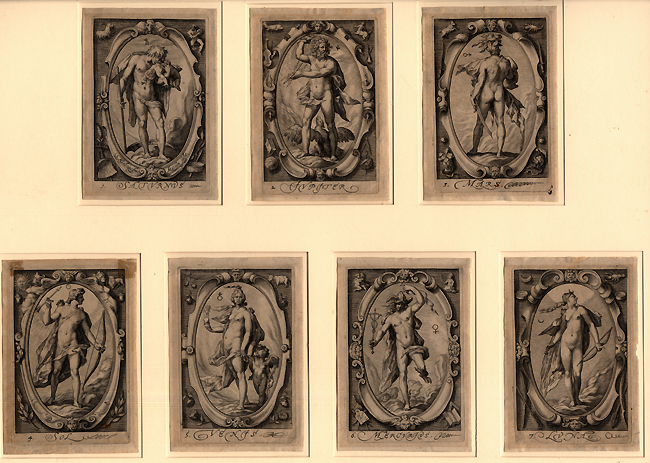
The Planets (Set of 7)
Other Images:

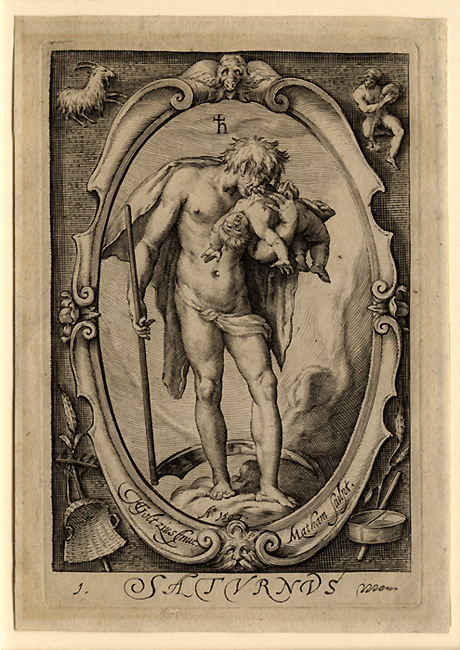
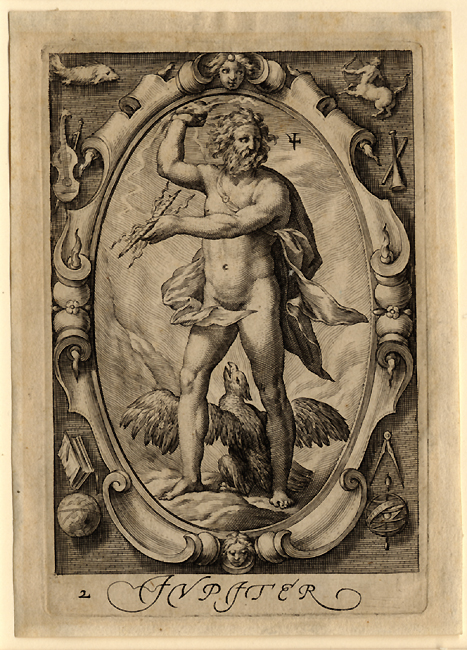
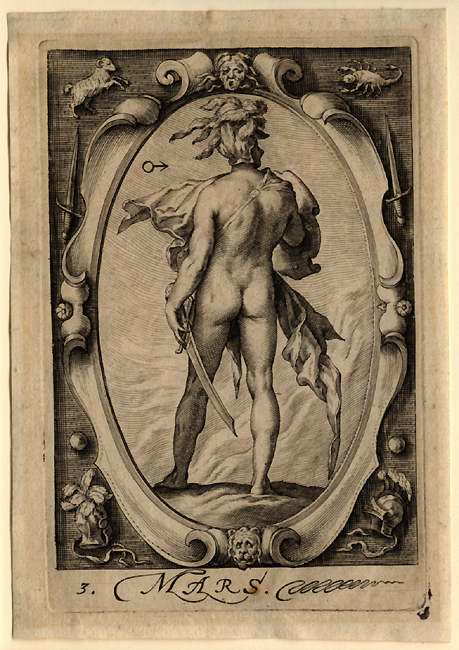
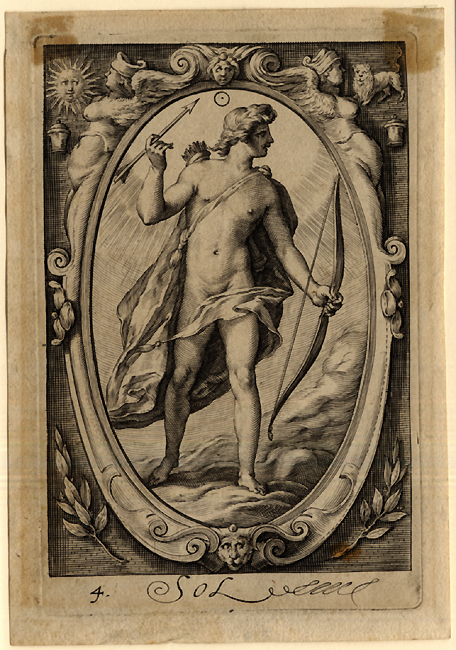
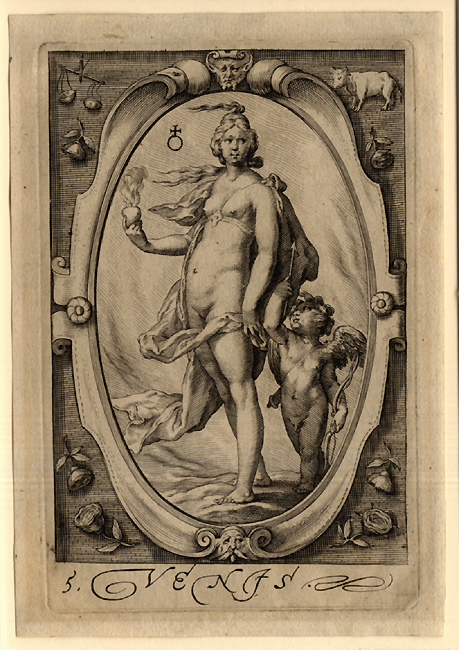
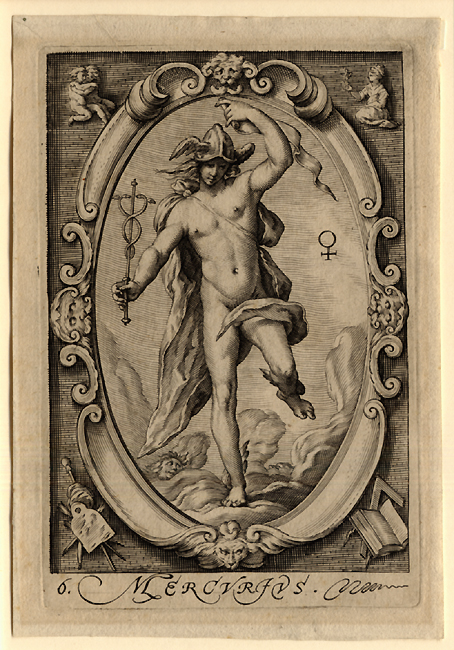
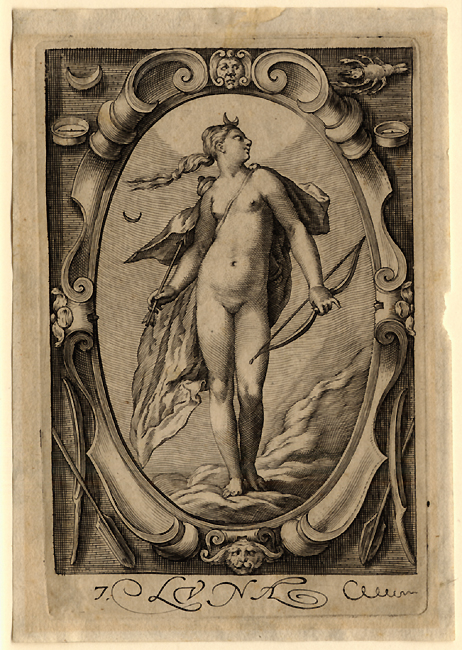
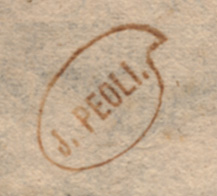








Engravings, 1597, 117 x 78 mm., Bartsch 149-155, Hollstein 226-232 i/ii. Superb, even impressions of the complete set, before the address of Janssonius in plate 1, on laid paper with uniform 5 mm. margins outside the platemarks; slight age toning, plate 4 with old tape stains in the upper corners. The planets here, of course, are represented by the gods for whom they were named, together with their attributes and astrological signs. The grouping is of a pre-Copernican system in which Earth is the center (therefore not a planet), but both the sun and the moon are considered such. Obviously, such images are more concerned with mythology and astrology than with astronomy, but Copernicus’ theory was not actually published until about1543 and was highly controversial for many years afterward. Uranus, Neptune and Pluto (the latter now downgraded and no longer identified as a planet) were not discovered until 200 years later, and so the planets, for Goltzius and Matham (and other artists of the time) were Saturn, Jupiter, Mars, the Sun, Venus, Mercury and the Moon. Though single images sometimes appear on the market, the complete set is quite rare, particularly in such fine, early impressions.
Provenance:
Juan Jorge Peoli (Lugt 2020 and Supplement and OnLine). Peoli (1825-1893) was born in New York of parents who came from Venezuela and were of Corsican background. At a young age, he moved with his parents to Cuba, where he later began the study of art with the intent of becoming a painter. An award allowed him to go to Rome, where he studied with Tommaso Minardi and he finished his studies in Madrid, where he also painted portraits of the royal family. He returned to Cuba and in 1861 established himself in New York. Interested in collecting since he was eighteen, he put together, during his European travels, an estimable collection of drawings, watercolors and old master prints which was, at the time, one of the finest in the United States. The sale of his collection was in 1894 in New York at the American Art Association.
![]()